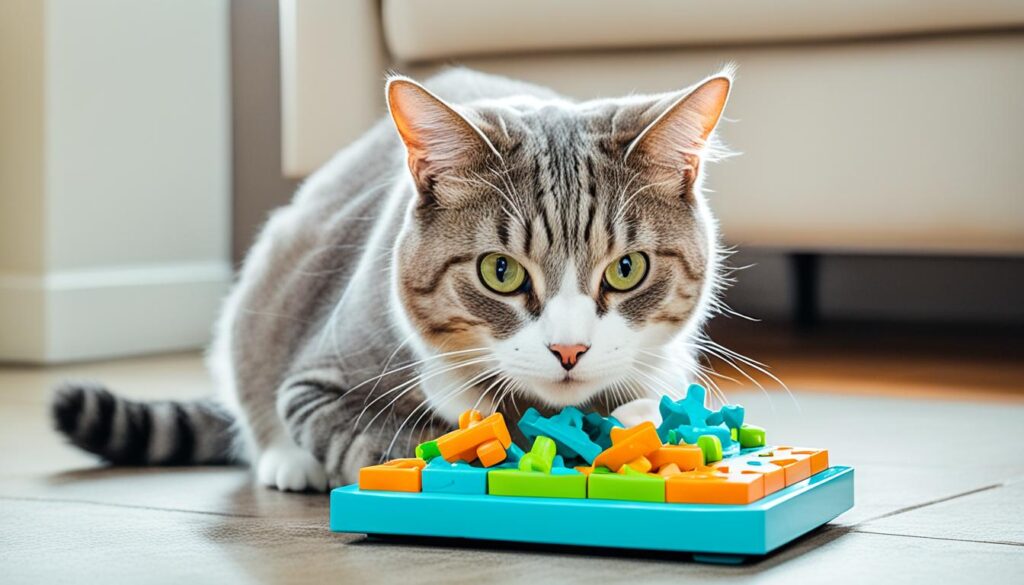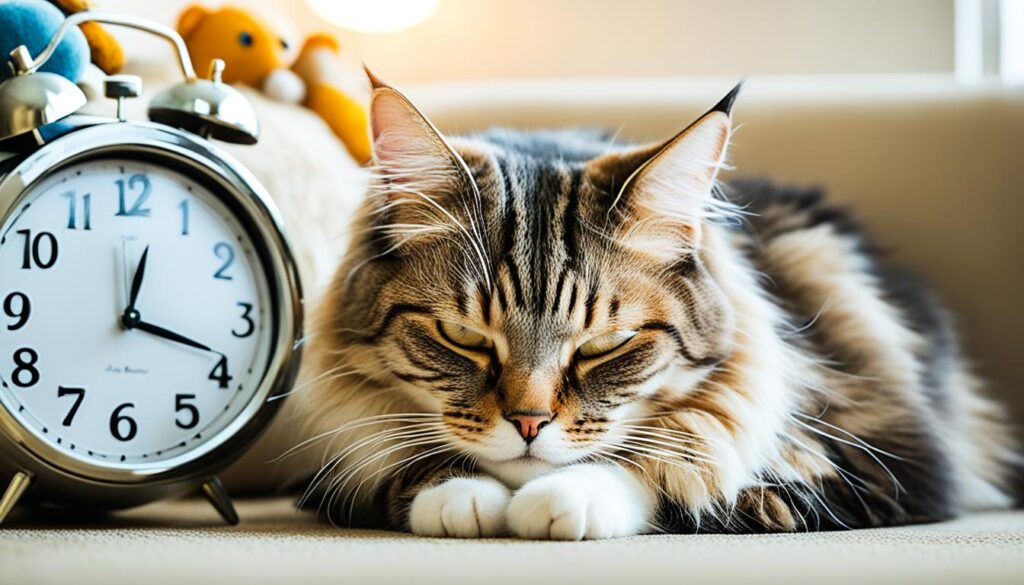Did you know that most healthy adult cats can be left alone for 8-24 hours?
Leaving your feline friend alone can be a common concern for cat owners. Whether it’s due to work commitments, travel, or other obligations, understanding how long you can safely leave your cat alone is crucial for their well-being.
Key Takeaways:
- Most healthy adult cats can be left alone for 8-24 hours
- Kittens and senior cats require more attention and should not be left alone for more than 8 hours
- Ensure your cat has access to food, water, and a kitty-proofed environment
- Cats can experience separation anxiety, depression, and loneliness when left alone for extended periods
- Consider a cat sitter or boarding facility for trips longer than 24 hours
How Long Can Healthy Adult Cats Be Left Alone?
Leaving a cat alone for extended periods is a common concern among cat owners. While cats are generally more independent than dogs, it is important to consider their needs for care, companionship, and stimulation. How long a healthy adult cat can be left alone depends on various factors such as age, health, and personality.
Typically, a healthy adult cat can be left alone for a typical 8-hour workday. In some cases, they can even tolerate being alone for longer periods, up to 10-12 hours. However, it is essential to ensure that their environment is prepared to meet their needs.
Before leaving a cat alone, make sure their environment is kitty-proofed and safe. Remove any potential hazards or toxic substances from their reach. Provide them with fresh food and water, and ensure that their litter box is clean and easily accessible.
If you need to leave your cat alone for a longer duration, such as a 24-hour span, take additional precautions. Consider leaving out extra food and water to ensure their sustenance. It’s crucial to remember that cats should not be left alone for more than a day without someone checking in on them. They need social interaction and care to thrive.
Each cat is unique, and their tolerance for being alone may vary. Factors such as age, health, and personality can influence their ability to cope with solitude. Some cats may be perfectly content being alone for longer periods, while others may become stressed or anxious.
When determining how long to leave your cat alone, it’s essential to consider their individual needs and provide suitable care and attention. If you’re unsure about leaving your cat alone for an extended period, consult with your veterinarian or a professional pet sitter for personalized advice.
Tips for Leaving Your Cat Alone:
- Ensure their environment is safe and free of hazards.
- Provide fresh food, water, and a clean litter box.
- Consider leaving out extra food and water for longer durations.
- Arrange for someone to check on your cat if leaving for more than a day.
- Provide enrichment activities such as toys, scratching posts, and perches.
How Long Can Kittens Be Left Alone?
When it comes to leaving kittens alone, it’s important to keep in mind that they require more attention and care compared to adult cats. Leaving kittens alone for long periods can lead to boredom, anxiety, and the development of destructive behaviors.
Here are some guidelines for how long kittens can safely be left alone:
| Kitten Age | Maximum Time Alone |
|---|---|
| Under 4 months | 2-4 hours |
| 5-6 months | Up to 5 hours |
| 6 months and older | Up to 8 hours |
It’s crucial to understand that younger kittens have limited bladder control and may require more frequent bathroom breaks. Providing a safe and stimulating environment is also important to prevent boredom and destructive behaviors. Ensure they have access to toys, scratching posts, and a comfortable resting place.
Remember, each kitten is unique, and their individual needs may vary. Use these guidelines as a starting point and observe your kitten’s behavior to determine their tolerance for being left alone. If you have concerns or need further advice, consult with your veterinarian or a professional cat behaviorist.
Signs of Cat Distress When Left Alone
When cats are left alone for extended periods, they can experience distress and exhibit various signs of discomfort. Recognizing these signs is crucial to understanding their emotional well-being and ensuring appropriate care. Here are some common signs of cat distress when left alone:
- Clinginess: Cats may become excessively clingy and seek constant attention when they feel lonely or anxious.
- Soiling outside the litter box: Stress and unease can cause cats to urinate or defecate outside their designated litter area.
- Diarrhea: Digestive issues, such as diarrhea, can occur as a result of heightened anxiety and stress.
- Refusal to eat: Cats may lose their appetite when feeling distressed, leading to a lack of interest in food.
- Excessive meowing: Cats often vocalize more than usual when they are seeking attention or expressing discomfort.
If you notice any of these signs in your cat when you leave them alone, it is essential to address their needs for social interaction and care. Consider hiring a reliable pet sitter or asking someone to check on your cat regularly when you are away. Providing companionship and engaging activities can help alleviate their distress and keep them content.
In the next section, I will share some enrichment activities to keep your cat entertained and mentally stimulated when they are home alone.
Enrichment Activities for Cats Home Alone

To ensure that your cat stays entertained and happy while home alone, it’s important to provide them with enrichment activities. These activities can help minimize boredom and prevent destructive behaviors. Here are some cat care tips and ideas for keeping your feline friend entertained:
- Leave out fresh food and water to “hunt”: Instinctively, cats are hunters. You can stimulate their natural hunting behavior by scattering their dry food or treats in different areas of the house. This encourages them to search and “hunt” for their food, keeping them mentally and physically engaged.
- Provide toys for playtime: Interactive toys, such as puzzle feeders or treat dispensers, can keep your cat entertained for hours. These toys challenge their problem-solving skills and provide mental stimulation. You can also rotate toys regularly to keep their interest piqued.
- Set up cat trees or perches near windows: Cats love to observe the world from a vantage point. Placing cat trees or perches near windows allows them to watch birds, squirrels, or the outside activity, keeping them entertained and mentally stimulated.
- Provide scratching posts: Scratching is a natural behavior for cats and helps them stretch their muscles and keep their claws in good condition. Providing scratching posts or boards not only satisfies their scratching needs but also keeps them entertained and prevents them from damaging your furniture.
- Play soft music or leave the TV on: Ambient background noise like soft music or leaving the TV on can help alleviate loneliness for cats. The sound provides a sense of companionship and can make them feel more at ease when home alone.
- Have someone drop by for playtime and cuddling: If possible, arrange for a family member, friend, or pet sitter to visit your cat during the day for playtime and cuddling. This social interaction can greatly reduce their feelings of loneliness and provide them with the attention they crave.
Remember, each cat is unique, so it’s important to experiment with different enrichment activities to find what works best for your furry friend. By keeping your cat entertained and mentally stimulated while they are home alone, you can ensure their overall well-being and happiness.
Leaving Cats Alone Overnight or for a Weekend
When it comes to leaving your cats alone for overnight trips or a weekend getaway, it’s essential to ensure their well-being and comfort. Here are some cat care tips and pet care advice to help you make the necessary arrangements:
1. Provide Access to Food, Water, and a Clean Litter Box: Before leaving, make sure your cats have enough dry food and fresh water to sustain them during your absence. Wet food may spoil if left out for too long, so it’s best to stick with dry food for overnight trips. Additionally, ensure their litter box is clean and easily accessible.
2. Consider a Cat Water Fountain: Some cats are picky about drinking stagnant water, so investing in a cat water fountain can help keep the water fresh and enticing for them. The circulating water will mimic a natural source, encouraging your cats to stay hydrated even when you’re not around.
3. Timed Automatic Feeder for Longer Trips: If you’re planning on leaving your cats alone for longer than 24 hours, consider using a timed automatic feeder. These devices dispense a predetermined amount of food at specific intervals, ensuring your cats are fed regularly even in your absence.
| Leaving Duration | Feeding Recommendation |
|---|---|
| Overnight trips | Dry food is suitable |
| Weekend getaway | Dry food is suitable |
| Longer than 24 hours | Consider a timed automatic feeder |
4. Provide Enrichment Activities: To keep your cats mentally stimulated and entertained while you’re away, leave out toys for them to play with. Interactive toys, puzzle feeders, and scratching posts can help prevent boredom and destructive behavior.
5. Don’t Forget Special Medication or Dietary Needs: If your cats have any specific medical conditions or dietary requirements, make sure to leave clear instructions and provide the necessary medications or specialized food.
By following these cat care tips and pet care advice, you can ensure that your cats are comfortable and content while you’re away overnight or for a weekend. However, it’s important to note that leaving cats alone for extended periods, such as a week, may not be ideal and other arrangements, such as hiring a pet sitter or boarding, may be necessary for their well-being.
Leaving Cats Alone for a Week
Leaving cats alone for an extended week-long period is not recommended. Cats require regular care, social interaction, and attention to ensure their well-being. When you’re away for a week, it’s important to have someone check in on your furry friend daily to provide necessary care and companionship.
Here are the essential cat care tips and pet care advice to help you navigate leaving your cat alone for a week:
- Fresh Food and Water: Ensure that your cat has access to fresh food and water every day. Leaving sufficient amounts of dry food and providing a water fountain can help maintain their hydration and nutrition.
- Litter Box: Clean the litter box regularly to maintain a clean and comfortable environment for your cat. If you’re leaving for a week, consider using a self-cleaning litter box or asking someone to take care of this essential task.
- Social Interaction: Cats can become lonely and anxious when left alone for extended periods. Arrange for someone to visit your cat daily to provide social interaction, playtime, and cuddles. This will help alleviate their boredom and ensure they feel loved.
While having someone check in on your cat is crucial, consider alternative options such as hiring a professional pet sitter or boarding your cat at a reputable facility. These options provide additional care, supervision, and interaction your cat may need during your absence.
Remember, the well-being of your cat should always be a top priority. By following these cat care tips and seeking reliable care options, you can ensure that your feline companion remains healthy, happy, and well-cared for while you are away.
Preparing Cats for Extended Absences
When you need to leave your cat for an extended period, it’s crucial to ensure they are well-prepared to handle the time alone. Here are some essential cat care tips and pet care advice to help you get your furry friend ready.
1. Prepare their environment
- Ensure the house is safe and kitty-proofed.
- Set up multiple litter boxes in different areas of the house.
- Provide cozy hiding spots and comfortable resting areas.
2. Ensure enough food and water
Make sure your cat has a sufficient supply of food and water for the duration of your absence. Consider using automated feeders to ensure regular meals. Additionally, provide fresh water in multiple locations and consider using a water fountain to encourage hydration.
3. Provide enrichment activities
Help keep your cat entertained and mentally stimulated by providing enrichment activities. Leave out interactive toys, scratching posts, and puzzle feeders. Consider leaving soft music or a television on to provide background noise.
4. Have someone check on your cat
It’s highly recommended to have someone check on your cat daily or hire a pet sitter while you’re away. This ensures your cat receives necessary care, social interaction, and attention. A friendly visitor can provide playtime, cuddles, and companionship.
Your cat’s well-being is of utmost importance, even when you can’t be there. By following these cat care tips and pet care advice, you can help ensure your furry friend stays happy, healthy, and content during extended absences.
The Impact of Age on Leaving Cats Alone

When it comes to leaving cats alone, age considerations play a significant role in determining their care needs. Very young kittens and senior cats require more attention and care compared to middle-aged cats. It’s crucial to understand the specific requirements of each age group to ensure their well-being when left alone.
Care Tips for Leaving Young Kittens Alone
For young kittens under four months old, it’s important to limit their alone time to no more than 4 hours. At this stage of their development, kittens require frequent feeding, supervision, and socialization. Leaving them alone for longer periods can be distressing and may hinder their proper growth and socialization skills.
Care Tips for Leaving Senior Cats Alone
Senior cats, on the other hand, may have age-related health issues and mobility restrictions that require additional care and attention. While they may be more independent than kittens, it’s essential to consider their needs when leaving them alone. Regular monitoring, providing easy access to food, water, and litter boxes, and ensuring a comfortable environment are crucial for their well-being.
Regardless of their age, cats thrive on human interaction. Leaving them alone for extended periods without any socialization can lead to stress, anxiety, and boredom. To mitigate these issues, it’s advisable to consider cat sitters, family or friends, or even boarding facilities to ensure that your cat receives the necessary care, attention, and companionship when you can’t be there.
Overall, leaving cats alone requires careful consideration of their age and individual needs. While healthy adult cats can tolerate longer periods of alone time, kittens and senior cats require more attention and care. Providing suitable care, including proper supervision, feeding, and social interaction, is essential to ensure their well-being when you’re not around.
The Importance of Social Interaction for Cats
Cats are sociable creatures that thrive on social interaction with their owners. While they may be more independent than dogs, they still require attention and companionship to maintain their overall well-being.
Lack of social interaction can have negative effects on a cat’s behavior and mental state. Cats that are deprived of social stimulation can become bored, stressed, anxious, and even depressed. They may exhibit destructive behaviors as a result, such as scratching furniture or excessively grooming themselves.
It is crucial to provide cats with adequate social interaction to ensure their happiness and contentment. Engaging with them through play, grooming, and cuddling not only strengthens the bond between you and your feline companion, but also provides mental stimulation and enrichment.
Benefits of Social Interaction for Cats:
- Reduced Boredom: Regular social interaction helps alleviate boredom, keeping cats entertained and preventing them from seeking destructive outlets for their energy.
- Stress Relief: Spending quality time with your cat can help reduce stress by providing a sense of security and comfort.
- Mental Stimulation: Interacting with your cat stimulates their mind and keeps them mentally sharp. Activities like puzzle toys and clicker training can provide additional mental enrichment.
- Physical Exercise: Many interactive play sessions involve physical activity, which helps keep your cat fit and healthy.
- Bonding: Social interaction strengthens the bond between you and your cat, fostering a loving and trusting relationship.
Tips for Providing Social Interaction for Your Cat:
- Schedule regular playtime sessions with interactive toys that simulate prey behavior, such as feather wands or laser pointers.
- Set aside dedicated cuddle and grooming time to show affection and provide physical touch.
- Consider adopting another compatible cat to provide companionship, especially if your cat is prone to loneliness.
- Create vertical spaces in your home, such as cat trees or perches, to allow your cat to observe their environment from different perspectives.
- Provide scratching posts and opportunities for climbing to satisfy your cat’s natural instincts.
Remember, every cat has unique social needs. Pay attention to your cat’s body language and preferences to tailor the social interaction to their individual personality and comfort level.
By prioritizing social interaction and providing appropriate enrichment activities, you can ensure that your cat leads a fulfilled and enriched life.
Options for Cat Care When Leaving Home
When it comes to leaving home for extended periods, it’s important to consider the care and well-being of your cat. Fortunately, there are various options available to ensure that your furry friend receives the attention and care they need. Here are a few cat care options to consider:
1. Having a Friend, Family Member, or Neighbor Check In
Enlisting the help of someone you trust, such as a friend, family member, or neighbor, can be a viable option for cat care. They can visit your home to check on your cat, provide fresh food and water, clean the litter box, and offer some social interaction. This option is especially beneficial if your cat is comfortable with familiar faces.
2. Hiring a Pet Sitter
If you prefer professional care for your cat, hiring a pet sitter is an excellent choice. A pet sitter can come to your home and provide comprehensive care, including feeding, grooming, playtime, and companionship. They can follow your instructions and ensure that your cat’s routine remains uninterrupted.
3. Boarding Your Cat
If you are concerned about leaving your cat alone at home, boarding your cat at a reputable facility may be the ideal solution. Boarding facilities offer a safe and comfortable environment for cats, with trained staff who provide care, attention, and socialization. Your cat can enjoy their own space and interact with other cats if desired.
Overall, the choice of cat care option depends on your cat’s individual needs and preferences. Consider their temperament, socialization requirements, and any specific medical or behavioral considerations. It’s important to ensure that your cat receives proper care and attention even when you are away.
| Options for Cat Care | Pros | Cons |
|---|---|---|
| Having a Friend, Family Member, or Neighbor Check In | – Familiar faces for your cat – Personalized care – Cost-effective |
– Potential scheduling conflicts – Limited availability – Lack of professional expertise |
| Hiring a Pet Sitter | – Professional care – Customizable services – Personalized attention |
– Costlier than other options – Finding a reliable sitter |
| Boarding Your Cat | – Safe and supervised environment – Socialization opportunities – Trained staff |
– Change of environment – Potential stress for some cats – Cost considerations |
Each option has its own advantages and disadvantages. Consider your cat’s personality, comfort level, and specific needs when selecting the appropriate cat care option. By choosing the right care arrangement, you can have peace of mind knowing that your cat is well taken care of in your absence.
Conclusion
Leaving cats alone for extended periods requires careful consideration of their age, health, and personality. As responsible pet owners, it is our duty to ensure their well-being even when we are not at home. By following these cat care tips, you can provide the best possible care for your feline friend when they are home alone.
First and foremost, providing enrichment activities is crucial to keep your cat stimulated and entertained. Leave out interactive toys, set up perches near windows for bird-watching, and provide scratching posts to satisfy their natural instincts.
Additionally, make sure your cat has access to fresh food and water throughout the day. Consider investing in automatic feeders and cat water fountains to regulate their intake and keep them hydrated. Keeping a clean litter box is essential for your cat’s hygiene and comfort, so be sure to maintain it regularly.
Most importantly, arrange for social interaction when you are away. Cats crave companionship, and leaving them alone for extended periods can lead to loneliness and stress. Ask a friend, family member, or neighbor to check in on your cat, or hire a professional pet sitter who can provide care, playtime, and affection.
By taking these cat care tips into consideration, you can ensure that your feline companion remains happy and healthy, even when you are not able to be by their side. Remember, every cat is unique, so tailor their care to their individual needs and always consult with a veterinarian for professional advice when necessary.
FAQ
How long can healthy adult cats be left alone?
How long can kittens be left alone?
What are the signs of cat distress when left alone?
What are some enrichment activities for cats home alone?
How long can cats be left alone overnight or for a weekend?
Is it safe to leave cats alone for a week?
How should cats be prepared for extended absences?
Does a cat’s age impact how long they can be left alone?
Why is social interaction important for cats?
What options are available for cat care when leaving home?
What are some general cat care tips for leaving cats alone?
References
|
International Cat Association (TICA) |
|
|
The Cat Fanciers’ Association (CFA) |
|
|
World Cat Federation (WCF) |
|
|
Fédération Internationale Féline (FIFe) |








[…] health and well-being. Proper grooming, skin care, and nutrition are essential for a happy and healthy cat. It’s also important to provide an optimal environment with plenty of opportunities for […]
[…] it comes to socializing with other pets and animals, Persian Cats may take some time to warm up and feel comfortable. However, with proper socialization and introduction, they can […]
[…] Cats are generally independent animals, but breeds like the Siamese, Birman, and Ragdoll may become lonely if left alone for long periods of time. […]
[…] Can Boxers and Bulldogs be left alone for long periods of time? […]
[…] Pyrenean Mountain Dogs should not be left alone for long periods of time as they can become bored and destructive. They require a lot of attention and […]
[…] Separation anxiety: They can become anxious and destructive when left alone for long periods of time. […]
[…] in regular playtime: Dedicate time each day to play with your cat using interactive toys. This helps them release excess energy and reduces the likelihood of foot […]
[…] only mix it into a small portion that you can feed by hand. This way, you can ensure that your cat consumes all of the medication without leaving any […]
[…] not recommended to leave any dog alone for extended periods of time, as they are social animals that require human interaction and attention. However, some […]
[…] May suffer from separation anxiety if left alone for long periods of time […]
[…] not ideal for any dog to be left alone for long periods of time, but some breeds may be more tolerant of solitude than […]
[…] dogs do not like being left alone for long periods of time and may become destructive if left alone too […]
[…] a healthy cat lifestyle and taking preventive measures can help prevent fevers and promote overall […]
[…] and other animals, including cats and other dogs. However, caution should be exercised when leaving them alone with smaller pets, as their hunting instincts may kick […]
[…] be trusted in times of need and can serve as a reliable watchdog, caution should be exercised when leaving children alone with the dog. This breed’s potential anxiousness and energetic nature need to be considered […]
[…] sense of independence and may occasionally retreat to quiet corners or high perches to enjoy some alone time and observe their […]
[…] thrive in the company of their families and can become anxious or develop destructive behavior if left alone for extended periods. They require companionship and mental […]
[…] stimulates the flow of milk from their mother’s teats, promoting their nourishment. As adult cats, they may continue this behavior as a sign of comfort and […]
[…] and determine the severity of the condition. With proper management and veterinary guidance, cats with feline asthma can lead happy and healthy […]
[…] them with a healthier and happier life. Consult with your veterinarian to determine the best time to neuter your male cat based on their age and overall […]
[…] is a dangerous condition for cats and can lead to unconsciousness and death if left […]
[…] cat is special, with their own growth and needs. Always talk to a vet to make sure your adult cat stays healthy and […]
[…] Inus love their freedom. They enjoy their alone time and don’t always want to be around. This can make training hard because they might not listen […]